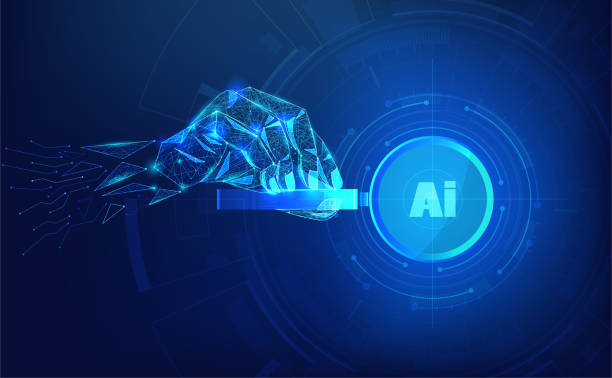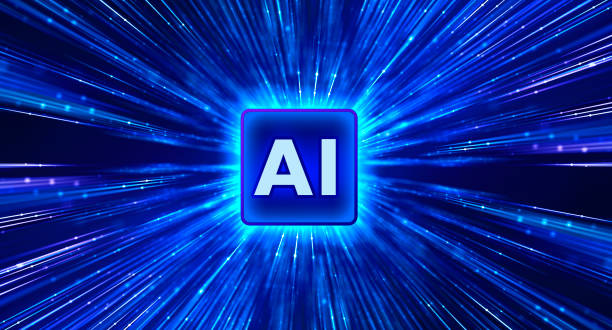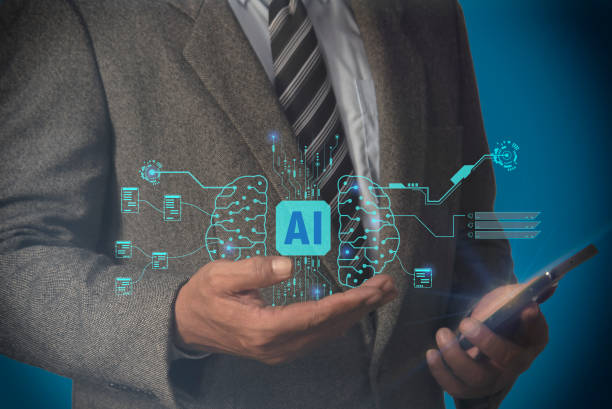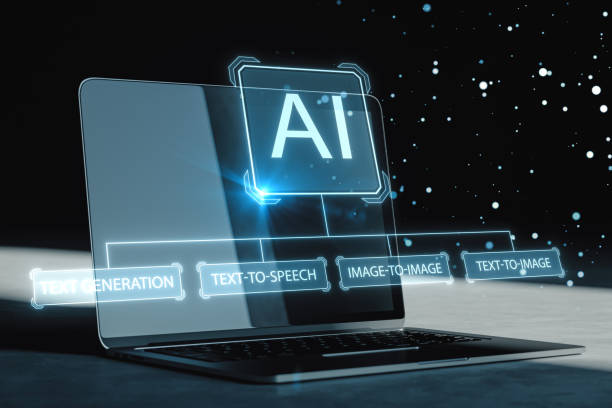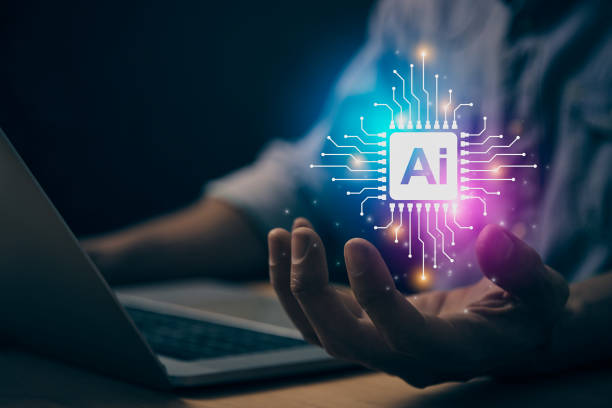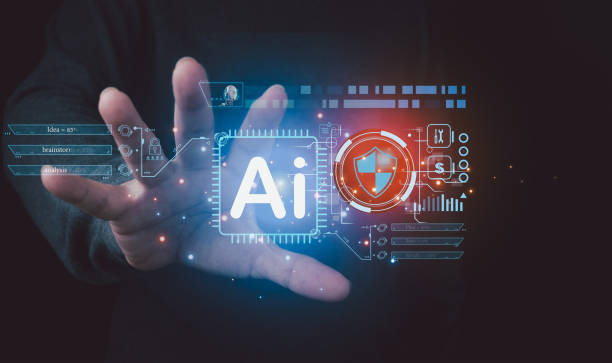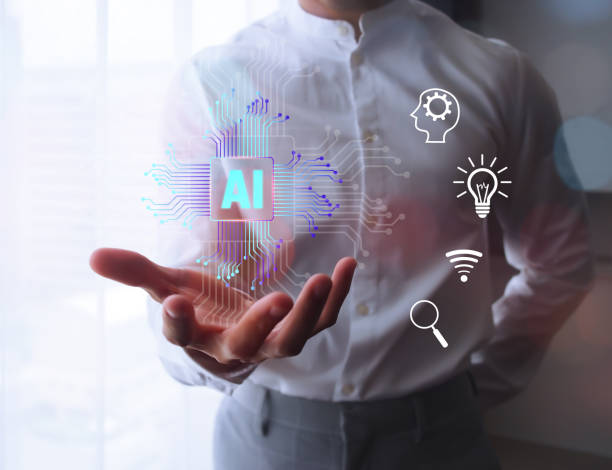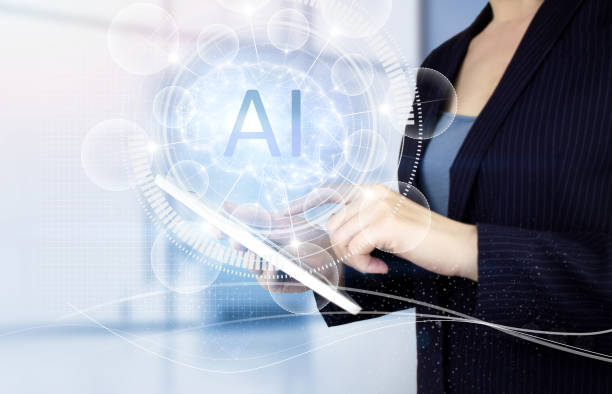What is Artificial Intelligence and How is it Transforming the World of Work?
What is Artificial Intelligence and How is it Transforming the World of Work?
#Artificial_Intelligence (AI), as a broad field in computer science, refers to the creation of machines capable of performing tasks that typically require human intelligence.
These tasks include learning, reasoning, problem-solving, language comprehension, and pattern recognition.
Artificial intelligence is no longer a far-fetched concept; it has now infiltrated many industries and aspects of our daily lives.
From voice assistants like Google Assistant and Siri to recommendation algorithms on platforms like Netflix and Amazon, artificial intelligence is constantly improving user experience and increasing efficiency.
The impact of artificial intelligence on the world of work is vast.
Automation of processes, increased productivity, and the creation of new job opportunities are just some of these impacts.
While some jobs may become obsolete due to automation, artificial intelligence simultaneously creates new jobs that require new and specialized skills.
For example, AI developers, data scientists, and AI analysts are among the new job roles that are rapidly growing.
A McKinsey study shows that artificial intelligence has the potential to increase global productivity by up to 40 percent, which could lead to significant economic growth.
The future of AI jobs is transforming, and organizations and individuals must prepare for these changes.
Is your online store ready to attract maximum customers and increase sales? Rasaweb transforms your online business by designing modern and efficient online stores.
✅ Increase speed and improve SEO
✅ Excellent user experience on mobile and desktop⚡ Get free consultation on online store design from Rasaweb!
New Job Opportunities Resulting from the Development of Artificial Intelligence
New Job Opportunities Resulting from the Development of Artificial Intelligence
The development of artificial intelligence not only threatens some jobs but also creates new and diverse job opportunities.
These opportunities exist in various fields, including the development, implementation, maintenance, and analysis of artificial intelligence systems.
Some of these opportunities include:
- AI and Machine Learning Engineers These individuals are responsible for designing, developing, and implementing AI and machine learning models.
Required skills include proficiency in programming languages such as Python, Java, and R, as well as in-depth knowledge in areas such as neural networks, machine learning algorithms, and natural language processing. - Data Scientists These professionals collect, analyze, and interpret data to identify patterns and trends that can help improve business decision-making.
They use statistical and machine learning tools and techniques to extract valuable information from data. - AI Analysts These individuals are responsible for evaluating the performance of AI systems and identifying areas where they can be improved.
They also help organizations optimize their AI strategies and ensure that these systems align with business goals. - AI Ethics Specialists With the increasing use of artificial intelligence, ethical issues related to it are becoming more important.
These specialists help organizations ensure that their AI systems are developed and used ethically and responsibly.
The future of AI jobs depends heavily on these skills, and individuals who acquire these skills can succeed in this emerging field.
According to a LinkedIn report, demand for AI engineers and data scientists has increased dramatically in recent years, and this trend is expected to continue in the coming years.
Jobs at Risk of Automation
Jobs at Risk of Automation
Although artificial intelligence creates new job opportunities, it also threatens some jobs.
Jobs that involve repetitive, routine, and programmable tasks are more at risk of automation.
Some of these jobs include:
- Production Line Workers Many tasks on production lines, such as packaging, assembly, and inspection, can be performed by robots and automation systems.
- Office Workers Tasks such as data entry, invoice processing, and answering frequently asked customer questions can be performed by intelligent software and robotic process automation (RPA).
- Drivers With the development of self-driving vehicles, the demand for taxi, truck, and bus drivers may decrease.
- Telephone Operators Automated answering systems and chatbots can perform many of the tasks of telephone operators.
However, it is important to note that automation does not necessarily mean the complete elimination of a job.
In many cases, automation can eliminate repetitive and tedious tasks, allowing employees to focus on more creative and strategic tasks.
The future of AI jobs is that employees must keep their skills up to date and be prepared to learn new skills to adapt to changes caused by artificial intelligence.
.styled-table thead tr {
background-color: #009879;
color: #ffffff;
text-align: left;
}
Click here to preview your posts with PRO themes ››
.styled-table th,
.styled-table td {
padding: 12px 15px;
}
.styled-table tbody tr {
border-bottom: 1px solid #dddddd;
}
.styled-table tbody tr:nth-of-type(even) {
background-color: #f3f3f3;
}
.styled-table tbody tr:last-of-type {
border-bottom: 2px solid #009879;
}
.styled-table tbody tr.active-row {
font-weight: bold;
color: #009879;
}
| Job | Probability of Automation |
|---|---|
| Production Line Worker | High |
| Office Worker | Medium |
| Truck Driver | Medium |
| Telephone Operator | High |
Essential Skills for Success in the Smart World of Work
Essential Skills for Success in the Smart World of Work
To succeed in the smart world of work, which is increasingly shaped by artificial intelligence, individuals must acquire new skills and update their existing skills.
Some of these skills include:
- Technical Skills Knowledge of programming, data analysis, and machine learning will be essential for many future jobs.
- Soft Skills Skills such as problem-solving, critical thinking, creativity, and collaboration help individuals succeed in complex and dynamic work environments.
- Communication Skills The ability to communicate effectively with others, whether in person or through digital tools, is essential for collaboration and coordination in teams.
- Learning Skills Given the rapid pace of technological change, the ability to learn continuously and adapt to new technologies is essential to maintaining competitiveness in the labor market.
The future of AI jobs shows that focusing on these skills will help individuals not only avoid the threats posed by automation but also benefit from the new opportunities that artificial intelligence creates.
Organizations should also increase their investment in employee training and development to prepare them for the smart world of work.
Online learning platforms like Coursera and Udemy are valuable resources for learning new skills.
Is your company website as professional and trustworthy as it should be? Create an online presence that reflects your credibility and attracts more customers with a specialized company website design by Rasaweb.
✅ Build a powerful and professional image of your brand
✅ Turn visitors into real customers
⚡ Get free consultation now!
The Impact of Artificial Intelligence on Various Industries
The Impact of Artificial Intelligence on Various Industries
Artificial intelligence is transforming various industries and has profound effects on how things are done.
Some of these effects include:
- Healthcare Artificial intelligence can help diagnose diseases, develop drugs, and provide personalized healthcare.
- Finance Artificial intelligence can help detect fraud, manage risk, and provide personalized financial services.
- Manufacturing Artificial intelligence can help automate processes, improve quality, and increase productivity.
- Retail Artificial intelligence can help improve customer experience, optimize the supply chain, and provide personalized offers.
The future of AI jobs varies across different industries, but in general, it can be said that artificial intelligence is creating new opportunities and improving efficiency in many areas.
For example, in the healthcare industry, artificial intelligence can help doctors diagnose diseases more accurately and provide more effective treatments.
In the financial industry, artificial intelligence can help banks and financial institutions detect fraud and manage risk.
Ethical and Social Challenges of Artificial Intelligence
Ethical and Social Challenges of Artificial Intelligence
The increasing use of artificial intelligence also brings several ethical and social challenges.
Some of these challenges include:
- Privacy The collection and use of personal data by artificial intelligence systems raise concerns about individuals’ privacy.
- Discrimination Artificial intelligence systems may, based on their training data, discriminate against certain groups of people.
- Accountability Determining responsibility in the event of errors or harm caused by artificial intelligence systems is a legal and ethical challenge.
- Transparency Many artificial intelligence systems operate as “black boxes,” and the way they make decisions is not understandable to humans.
The future of AI jobs requires attention to these challenges to ensure that artificial intelligence is used ethically and responsibly.
Organizations and governments should develop laws and regulations that protect individuals’ privacy, prevent discrimination, determine accountability, and increase the transparency of artificial intelligence systems.
Training and Developing the Workforce for the Age of Artificial Intelligence
Training and Developing the Workforce for the Age of Artificial Intelligence
To prepare the workforce for the age of artificial intelligence, investment in training and development is essential.
This includes:
- Training Technical Skills Providing training courses in areas such as programming, data analysis, and machine learning is essential to increase the technical skills of the workforce.
- Developing Soft Skills Training soft skills such as problem-solving, critical thinking, and creativity helps individuals succeed in complex and dynamic work environments.
- Promoting Lifelong Learning Encouraging individuals to learn continuously and adapt to new technologies is essential to maintaining competitiveness in the labor market.
- Collaboration Between Industry and Academia Collaboration between industry and academia can help provide training courses relevant to the needs of the labor market and train a skilled workforce.
Click here to preview your posts with PRO themes ››
The future of AI jobs depends on these trainings.
Governments and organizations should work together to design and implement training and development programs that prepare the workforce to face the challenges and benefit from the opportunities of the age of artificial intelligence.
.styled-table thead tr {
background-color: #27ae60;
color: #ffffff;
text-align: left;
}
.styled-table th,
.styled-table td {
padding: 12px 15px;
}
.styled-table tbody tr {
border-bottom: 1px solid #dddddd;
}
.styled-table tbody tr:nth-of-type(even) {
background-color: #f3f3f3;
}
.styled-table tbody tr:last-of-type {
border-bottom: 2px solid #27ae60;
}
| Skill | Importance | Training Solution |
|---|---|---|
| Programming | High | Online Courses and Boot Camps |
| Data Analysis | High | Training Workshops and Specialized Certificates |
| Critical Thinking | Medium | Problem-Solving Workshops |
| Creativity | Medium | Innovation and Design Courses |
The Role of Governments in Managing Changes Caused by Artificial Intelligence
The Role of Governments in Managing Changes Caused by Artificial Intelligence
Governments play an important role in managing the changes caused by artificial intelligence.
This includes:
- Policymaking Developing policies and regulations that ensure the ethical and responsible use of artificial intelligence.
- Investing in Research and Development Supporting research and development in the field of artificial intelligence to advance technology and create new opportunities.
- Training and Developing the Workforce Investing in training and developing the workforce to prepare individuals for the age of artificial intelligence.
- Creating Social Safety Nets Providing social support for individuals who lose their jobs due to automation.
The future of AI jobs requires governments to play an active role in managing the changes caused by artificial intelligence to ensure that this technology is used for the benefit of society.
Governments should work with industry, academia, and non-governmental organizations to develop and implement comprehensive strategies for managing the changes caused by artificial intelligence.
Tired of missing business opportunities due to not having a professional company website? Don’t worry anymore! With Rasaweb’s corporate website design services:
✅ The credibility and professionalism of your brand increases.
✅ You attract more customers and sales leads.
⚡ Get a free consultation to get started now!
Possible Scenarios for the Future of Work with the Expansion of Artificial Intelligence
Possible Scenarios for the Future of Work with the Expansion of Artificial Intelligence
The future of work with the expansion of artificial intelligence can have different scenarios:
- Optimistic Scenario In this scenario, artificial intelligence helps increase productivity, create new job opportunities, and improve the quality of life.
By acquiring new skills, individuals benefit from the opportunities created by artificial intelligence, and the skills gap is reduced. - Pessimistic Scenario In this scenario, artificial intelligence leads to widespread job losses, increased inequality, and a skills gap.
Individuals lacking the necessary skills are removed from the labor market, and social problems increase. - Realistic Scenario In this scenario, artificial intelligence creates both opportunities and challenges.
Some jobs are lost, but new jobs are also created.
Individuals must keep their skills up to date, and governments must develop and implement appropriate policies to manage the changes caused by artificial intelligence.
The future of AI jobs depends on our choices.
By investing in training and development, developing appropriate policies, and paying attention to ethical and social challenges, we can benefit from the advantages of artificial intelligence and avoid its dangers.
How to Prepare for the Future of Work in the Age of Artificial Intelligence
How to Prepare for the Future of Work in the Age of Artificial Intelligence
To prepare for the future of work in the age of artificial intelligence, you can take the following steps:
- Keep Your Skills Up to Date Attend training courses, read relevant books and articles, and familiarize yourself with new technologies.
- Strengthen Your Soft Skills Focus on developing problem-solving, critical thinking, creativity, and collaboration skills.
- Network Connect with experts in the field of artificial intelligence and learn from their experiences.
- Be Flexible Be prepared to change and adapt to new technologies.
Click here to preview your posts with PRO themes ››
The future of AI jobs is bright, but it requires preparation and effort.
By taking these steps, you can take advantage of the opportunities created by artificial intelligence and succeed in the future world of work.
By checking the websites Indeed and Glassdoor, you can stay informed about the latest job opportunities.
Frequently Asked Questions
| Question | Answer |
|---|---|
| What impact will artificial intelligence have on the future labor market? | Artificial intelligence automates repetitive jobs, but it will also create new and more complex jobs in areas such as development, maintenance, and training of artificial intelligence systems. |
| Which jobs are more at risk of being replaced by artificial intelligence? | Jobs that involve repetitive, rule-based tasks with little need for creativity or emotional intelligence, such as some manufacturing jobs, data entry, and simple customer service, are more at risk. |
| What skills are essential for success in the future of work with artificial intelligence? | Skills such as critical thinking, complex problem-solving, creativity, emotional intelligence, data literacy, the ability to work with artificial intelligence, and lifelong learning are of great importance. |
| Will artificial intelligence cause widespread unemployment? | Some jobs will be lost, but history has shown that new technologies, instead of causing widespread unemployment, reshape the labor market and create new jobs. The need for adaptation and retraining is important. |
| What new job opportunities are emerging with the rise of artificial intelligence? | Jobs such as machine learning engineer, data scientist, artificial intelligence ethicist, Human-AI Interaction Designer, and digital transformation consultant are among the new opportunities. |
| What is the role of education in preparing for the future of work with artificial intelligence? | Education should focus on developing soft skills, computational thinking, digital literacy, and the ability to learn continuously to prepare individuals for future changes. |
| How can I prepare myself for the labor market changes caused by artificial intelligence? | By learning new skills related to artificial intelligence and data, strengthening soft skills, developing critical thinking and creativity, and getting into the habit of lifelong learning, you can prepare yourself. |
| Will artificial intelligence ethics become an important job field? | Yes, given the increasing concerns about biases, privacy, and automated artificial intelligence decision-making, the role of artificial intelligence ethics professionals will be critical to ensuring its responsible development. |
| What is the importance of human-artificial intelligence collaboration in the future of work? | Human-artificial intelligence collaboration, instead of competition, shapes the future of the labor market. Artificial intelligence can be a tool to increase productivity and focus humans on more complex and creative tasks. |
| Which industries will be most affected by artificial intelligence? | Almost all industries will be affected, but areas such as healthcare, finance, transportation, manufacturing, education, and customer service are pioneers in the adoption and transformation by artificial intelligence. |
And other services of Rasa Web advertising agency in the field of advertising
Smart direct marketing: designed for businesses that seek digital branding through user experience customization.
Smart digital advertising: designed for businesses that seek customer acquisition through Google advertising management.
Smart Google Ads: a dedicated service to increase website visits based on Google advertising management.
Smart social media: transform customer behavior analysis with the help of intelligent data analysis.
Smart reporting: a fast and efficient solution for increasing website visits with a focus on dedicated programming.
And more than hundreds of other services in the field of internet advertising, advertising consulting, and organizational solutions
Internet advertising | Advertising strategy | Advertorial
Resources
What is Artificial Intelligence and How Does It Work?
,Artificial Intelligence in Occupational Areas
,The Future of Artificial Intelligence Jobs
,The Importance of Artificial Intelligence in Industry
? Are you ready to transform your business in the digital world? Rasa Web Advertising Agency offers comprehensive and effective solutions for your powerful presence on the web with a specialized team and a modern approach.
From modern UI website design and professional SEO to intelligent social media management and targeted advertising campaigns, we provide everything you need to shine online. Take a big step towards lasting success with Rasa Web Afarin.
📍 Tehran, Mirdamad Street, next to the Central Bank, South Kazerun Alley, Ramin Alley No. 6

